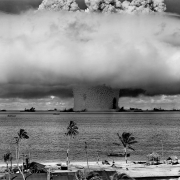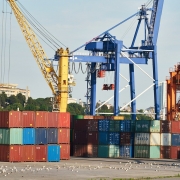What caused the Sino-Vietnamese War of 1979?
Topic of Study [For H2 History Students]:
Paper 2: Regional Conflicts and Co-operation
Source Based Case Study
Theme III Chapter 2: ASEAN (Growth and Development of ASEAN: Building regional peace and security – relations between ASEAN and external powers)
Topic of Study [For H1 History Students]:
Essay Questions
Theme II Chapter 2: The Cold War and Southeast Asia (1945-1991): ASEAN and the Cold War (ASEAN’s responses to Cold War bipolarity)
Historical context: The Sino-Soviet split
On 17 February 1979, Chinese forces entered the northern border of Vietnam, sparking off a war between the two. Although the war only lasted for a month, it had significant impacts in the 1980s, such as increased involvement by the regional organisation ASEAN during the Third Indochina War.
Before the war, China and the Soviet Union were at odds with one another. During the Vietnam War, the two Communist powers offered aid to North Vietnam in hopes of isolating the other party and assuming leadership in the ideological bloc. Initially, Hanoi sided with China to resist the American forces in Vietnam.
The deteriorating Sino-Soviet relationship during the latter part of the 1960s eventually derailed Chinese-Vietnamese relations. While the Soviet Union did indeed use its support for North Vietnam in an attempt to win influence in Hanoi, China did so as well, hoping to coerce the Vietnamese into endorsing Beijing’s hard-line anti-Soviet revisionist position. Especially after suffering significant military losses during the 1968 Tet Offensive, the Vietnamese, who needed help from both socialist nations, were greatly annoyed by China’s increasing intractability, particularly the PRC’s growing perception of the Soviet Union, not the United States, as the primary threat to China’s national security in early 1969. Perhaps even worse, Beijing began to withdraw Chinese troops from Vietnam, although leaders promised that the forces would return if the Americans came back.
An excerpt from “Deng Xiaoping’s Long War: The Military Conflict Between China and Vietnam, 1979-1991” by Zhang Xiaoming.
However, Hanoi allied with the Soviet Union in the mid-1970s, as seen by its admission to the Council of Mutual Economic Cooperation (COMECON) in August 1978. Also, the two nations signed the Treaty of Friendship and Co-operation in November 1978. In return, Vietnam received extensive military support from the Soviets.
From then on, China-Vietnam relations had soured.
Chinese engagement with Thailand
After Vietnam signed the treaty with the Soviet Union, Deng met Thai Prime Minister General Kriangsak Chamanan, offering to withdraw support for the Communist Party of Thailand (CPT) and strengthen Thai border security. This was to assure the Thai authorities that the looming Vietnamese threat would be pre-empted.
On 25 December 1978, nearly 220,000 Vietnamese troops invaded Kampuchea. By January 1979, the pro-Beijing Khmer Rouge was forcibly removed from power. Instead, a Vietnamese puppet government known as the Kampuchean United Front for National Salvation (FUNSK) was established and helmed by Heng Samrin.
Increased Chinese hostility: Teach Vietnam a lesson
On 7 January 1979, the Chinese government wrote a letter to the United Nations, accusing Vietnam on invading Kampuchea by force and seeking to create an “Indochinese Federation” with the help of the Soviet Union. Deng remarked in a meeting with the US President Jimmy Carter that they should “put a restraint on the wild ambitions of the Vietnamese and to give them an appropriate limited lesson”.
Afterwards, the Sino-Vietnamese War began in February 1979. The People’s Liberation Army (PLA) mobilised 400,000 troops, an extremely large undertaking ever since their intervention in the Korean War. During the clash, both sides suffered significant losses. On 16 March 1979, the Sino-Vietnamese War came to an end.
However, the PLA were willing to absorb heavy losses, as long as the conflict achieved its strategic goals. The PLA believed these goals had been achieved, and that the war had succeeded in ‘exposing Moscow’s inability or unwillingness to back Vietnam’. While the use of force against Vietnam had been condemned by the US, albeit ambiguously, and raised the suspicions of regional states such as Indonesia and Malaysia, ultimately there was very little backlash, regionally or internationally.
An excerpt from “ASEAN Resistance to Sovereignty Violation: Interests, Balancing and the Role of the Vanguard State” by Laura Southgate.
After the war, Beijing stated five reasons to explain why they attacked Vietnam:
- Vietnam had become a hegemonic power, claiming to be the world’s third military superpower.
- Hanoi refused to respect China’s borders and repeatedly made incursions.
- Mistreatment of the Chinese in Vietnam.
- Oppression of the Vietnamese people.
- The Soviet Union’s expansionist policy in Southeast Asia to undermine China.
Consequences on the Kampuchean conflict
Yet, the month-long clash had failed to halt Vietnam’s occupation of Kampuchea. Open hostilities between China and Vietnam had persisted even after.
The two viewpoints expressed above bring to light the fact that both Hanoi and Beijing were at odds with each other principally because they were competing for influence in the region and feared what would happen if the other succeeded. Thus, for the Chinese, border problems, ethnic Chinese problems, and other problems could not be separated from Vietnam’s overall ambitions in Indochina because they reflected Hanoi’s expansionist tendencies.
An excerpt from “Dragons Entangled: Indochina and the China-Vietnam War” by Steven J. Hood.
What can we learn from this article?
Consider the following question:
– How far do you u agree that the Sino-Vietnamese War was key in explaining Chinese involvement in the Third Indochina War?
Join our JC History Tuition to study the Cold War. The H2 and H1 History Tuition feature online discussion and writing practices to enhance your knowledge application skills. Get useful study notes and clarify your doubts on the subject with the tutor. You can also follow our Telegram Channel to get useful updates.
We have other JC tuition classes, such as JC Math Tuition and JC Chemistry Tuition. For Secondary Tuition, we provide Secondary English Tuition, Secondary Math tuition, Secondary Chemistry Tuition, Social Studies Tuition, Geography, History Tuition and Secondary Economics Tuition. For Primary Tuition, we have Primary English, Math and Science Tuition. Call 9658 5789 to find out more.
T











